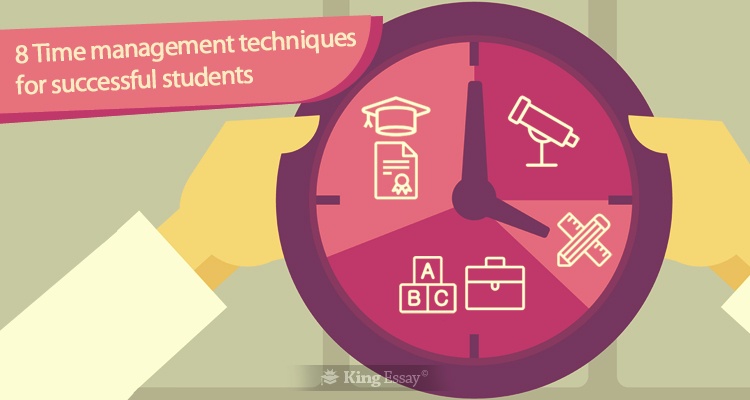8 Time Management Techniques for Successful Students
Posted on: November 23, 2017
Effective time management skills when employed appropriately will have a direct influence on a student’s performance and academic standing. Today’s students have to contend with dealing with an enormous amount of distractions in comparison to the students of yesteryears. Let’s look at some of the goals which need to be applied by students at the time of effectively employing time management tools.

- Responsibility and Dedication: Avoid silly writing mistakes when transcribing your agenda. Do not schedule time for activities that you know you will not complete. Keep your agenda completely confidential but make sure that it is written in a flawless and unambiguous manner which is easily comprehensible by yourself. The agenda should include distinct goals associated with explicit deadlines.
- Focusing on Time vs. Activities: Instead of focusing all of your time to complete that literature review dissertation, schedule time slots for each activity. Think in terms of time rather than activities taking in to consideration on average how long it will take to complete that activity. Schedule long intervals of working on a single activity without breaks only if it is completely necessary.
- Multitasking: Contemporary research has confirmed that multitasking is killing your brain. It is a myth and the human brain can only effectively concentrate on a single activity at a time. The human mind is not programmed like electronic hardware and if you try to multi-task too many activities at once your overall performance will decline.
- Establishing Priorities: Instead of having to pay someone to do assignment at the last moment, schedule time for activities in order of importance. The more important a task is, the earlier during the day it should be scheduled. As the day progresses the overall work efficiency of the body depreciates therefore schedule trivial or inconsequential tasks for later in the day.
- Importance of Surroundings: Each student has different preferences which will help them to concentrate on completing the thesis instead of having to buy a dissertation online. Establish your working environment based on your personal inclinations and predilections which will help you to achieve maximum efficiency during work. At the time of performing highly daunting or intimidating tasks, do not hesitate to use a “Do Not Disturb” sign to ensure focus.
- Deploying Free Time Wisely: There will be times when you will be doing something but your mind will be completely free to wander off. For example, at the time of using public transport you can easily review academic notes and materials to prepare yourself for the upcoming quiz or examination.
- Exercise: Students are at a crucial stage in their life when it is completely necessary to understand the importance of exercise. Not scheduling appropriate physical exercise and activities can also impair the productive functioning of the brain. Initially it will be hard to include this in your routine but once you maintain exercise for longer periods of time you will accrue physical benefits.
- Sleep: A person’s complete day can become completely unproductive and futile if they have not had a good night’s rest. During the course of the day mental stress, tension and apprehension accumulate in the mind. The best way to leave all your worries behind is to get a good night’s rest. Know how much sleep you need to get according to your age or physical condition and schedule it in.
Distractions can easily cause students to lose sight of their more critical and practical academic goals and objectives and have a substantially negative impact on their future career and life goals. If these pertinent time management techniques are applied successfully they will be more productive in securing quality free time.
In addition to employing these techniques scholars should keep a record of their career and personal goals and associate them with a practical timeline. For example, a person might have a goal to buy a brand new car or property by the time they reach a certain age. Goals like these will help to build perspective and an unprecedented personality.